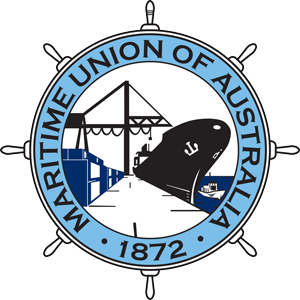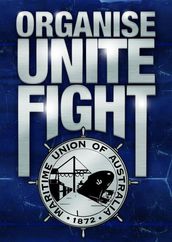 The Seaman's Union of Australia and Waterside Workers Federation merge to create the Maritime Union of Australia (1993). Thelead-up to the merger saw the Marine Cooks Bakers and Butchers Association (formed in 1908) amalgamated with the SUA in 1983, and the Federated Marine Stewards and Pantrymen's Association merged in 1988. In 1991 the Professional Divers Association also amalgamated with the S.U.A.
The Seaman's Union of Australia and Waterside Workers Federation merge to create the Maritime Union of Australia (1993). Thelead-up to the merger saw the Marine Cooks Bakers and Butchers Association (formed in 1908) amalgamated with the SUA in 1983, and the Federated Marine Stewards and Pantrymen's Association merged in 1988. In 1991 the Professional Divers Association also amalgamated with the S.U.A.
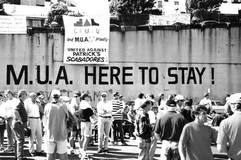 Patrick Corporation CEO Chris Corrigan undertakes an illegal restructuring of operations for the claimed purpose of increasing theproductivity of the workforce and locks out MUA members in April 1998, sparking an 80-day dispute that galvanizes the entire labour movement. MUA wins critical litigation and members return to their jobs when Justice Tony North orders the reinstatement of rights for the workers, saying in his legal ruling that, "By dividing the functions of employing workers and owning the business between two companies, the Patrick group put in place a structure which made it easier for it to dismiss the whole workforce. It is arguable on the evidence that this was done because the employees were members of the union."
Patrick Corporation CEO Chris Corrigan undertakes an illegal restructuring of operations for the claimed purpose of increasing theproductivity of the workforce and locks out MUA members in April 1998, sparking an 80-day dispute that galvanizes the entire labour movement. MUA wins critical litigation and members return to their jobs when Justice Tony North orders the reinstatement of rights for the workers, saying in his legal ruling that, "By dividing the functions of employing workers and owning the business between two companies, the Patrick group put in place a structure which made it easier for it to dismiss the whole workforce. It is arguable on the evidence that this was done because the employees were members of the union."
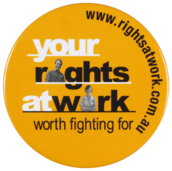 Starting in 2005, the MUA plays a central role in the labour-wide "Your Rights at Work" campaign to defeat the Howard Government'santi-union Work Choices. In one day, the 15th of November 2005, a national day of protest brings over half a million people to marches and protests in Australia's state capitals and other cities. A year later, on 30th November 2006, another national day of protest, with rallies or meetings in about 300 sites nationwide, bring out tens of thousands including for the Melbourne crowd ranged from 45,000 to 65,000 people in Melbourne, 40,000 in Sydney, and 20,000 in Brisbane.The campaign is central to the defeat of the Conservative government in the 2007 elections.
Starting in 2005, the MUA plays a central role in the labour-wide "Your Rights at Work" campaign to defeat the Howard Government'santi-union Work Choices. In one day, the 15th of November 2005, a national day of protest brings over half a million people to marches and protests in Australia's state capitals and other cities. A year later, on 30th November 2006, another national day of protest, with rallies or meetings in about 300 sites nationwide, bring out tens of thousands including for the Melbourne crowd ranged from 45,000 to 65,000 people in Melbourne, 40,000 in Sydney, and 20,000 in Brisbane.The campaign is central to the defeat of the Conservative government in the 2007 elections.
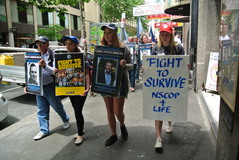 Thousands participate in rallies and actions as the MUA embarks on a country-wide campaign to enact the first-ever national safety code(NSCOP). Fathers,mums, sisters, brothers created a chorus of the vast majority of Australians who were pitted against a small collection of stevedoring companies and their corporate allies. For maritime workers, the code is a fight for survival. But, the campaign is also supported by workers in every industry because the code represents basic Australian values: life before profits, societal well-being before individual gain.
Thousands participate in rallies and actions as the MUA embarks on a country-wide campaign to enact the first-ever national safety code(NSCOP). Fathers,mums, sisters, brothers created a chorus of the vast majority of Australians who were pitted against a small collection of stevedoring companies and their corporate allies. For maritime workers, the code is a fight for survival. But, the campaign is also supported by workers in every industry because the code represents basic Australian values: life before profits, societal well-being before individual gain.
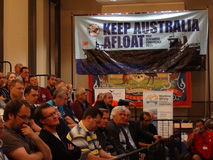 The MUA champions major shipping reform legislation that passed in June 2012, hailing a simplified three-tier licensing framework forparticipation in the coastal trade and restoring fair cabotage; establishing a genuine national flag through the Australian International Shipping Register, putting Australian companies on a level footing with international competitors; establishing a Maritime Workforce Development Forum to progress key maritime skills and training priorities; and a zero corporate tax rate similar to the European tonnage tax systems to remove barriers to investment in Australian shipping and to foster the global competitiveness of the shipping industry.
The MUA champions major shipping reform legislation that passed in June 2012, hailing a simplified three-tier licensing framework forparticipation in the coastal trade and restoring fair cabotage; establishing a genuine national flag through the Australian International Shipping Register, putting Australian companies on a level footing with international competitors; establishing a Maritime Workforce Development Forum to progress key maritime skills and training priorities; and a zero corporate tax rate similar to the European tonnage tax systems to remove barriers to investment in Australian shipping and to foster the global competitiveness of the shipping industry.

